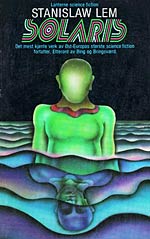
![]() gloker
gloker
2/22/2014
![]()
Solaris by Lem Stanislaw is one of the best examples of finally reading the book after seeing the movie(s) and (re-)discovering that a good book is always so much better than its movie(s)!
Apparently, there was first a Russian two part television adaptation that was released on dvd in 2009 - which I have not seen. (I just saw that this version is posted now on Youtube). Then the classic Russian film from 1972 by Andrei Tarkovsky (a director I greatly admire*, even if he felt compelled to embellish this story a bit too much), and finally, the abomination, in 2002 which totally throws out the book's central theme.
This novel raises great questions about the ability of humans to understand the universe, the limitations of our own physical and mental talents to interact and explain aspects that may lay beyond our grasp. Lem himself described how part of the novel's intent was to show how "human beings, dependent on random events, are also doomed to incoherent eternity since they consist of an archaic mixture of biology with a mind always searching for new ideas, an amalgam of animal instincts with sublime ideas."
And referring disparaging to the 2002 movie, he pointed out that he "only wanted to create a vision of a human encounter with something that certainly exists, in a mighty manner perhaps, but cannot be reduced to human concepts, ideas or images. This is why the book was entitled "Solaris" and not Love in Outer Space."
In addition, through the book's narrative Lem humorously exposes scientists' weaknesses, while poking fun at their institutions. Lem describes it as the "cacophonic character of scientific research - mutually contradictory concepts in a field characterized by exaggerated ambition, lust for success and popularity."
This is a thoughtful, brilliant, and, at points, hilarious exploration of how even with all human consciousness, intelligence and even with all the scientific and social efforts striving to advance and explore, and, ultimately, the desire to make contact with non-earth life, we may simply not be up to the task. The sad part is that we may not even be capable of recognizing how inadequate we are. Instead, we find strategies to disquise the truth from ourselves. We are tricked, trapped, and tested by shadows from our own mind as this story makes wonderfully and metaphorically clear.
I should mention that the translation I read by Joanna Kilmartin and Steve Cox was an English translation in 1970 from an earlier French 1964 translation of the original Polish. This first translation into English was reportedly one that Lem (who did know English well) considered second-rate. I have subsequently learned that a more recent translation in 2011 by Bill Johnston direct from Polish to English is available on audiobooks by Audible.com.
* check out his film adaptation titled "Stalker" made in 1979 of Roadside Picnic by the Strugatsky brothers. Now that was a great adaption of a great story! I'd encourage everyone, if they haven't, to read the one and view the other!